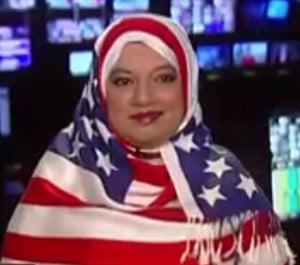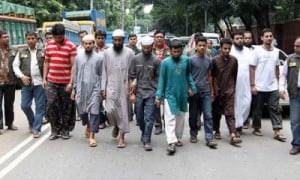The state of Georgia, which just last year infamously jailed a woman for wearing a hijab in a courtroom, is now under controversy again: this time Georgia State University is discriminating against a former student and visiting instructor.
The start of the bullying began when Dr. Mary Stuckey, a senior faculty member in the communications department asked Slma Shelbayah, a GSU alum and former Arabic instructor, if she was carrying any bombs under her headscarf. This account breaks down the chain of events well, as described by Shelbayah and Dr. Dona Stewart, the head of GSU’s Middle East Institute.
Shelbayah was harassed with this question repeatedly before she filed a formal complaint with the Dean of College of Arts and Sciences, with the help of Dr. Stewart, the director of the Middle East Institute. Dr. Stewart claims she suffered immediate mistreatment that “impaired her ability to fulfill federal grant commitments and harmed her career.” That and the racist remarks against Shelbayah prompted her to resign, after investing 13 years at GSU.
The Atlanta Journal-Constitution briefly covers the story here, running a summary of the complaint filed by Ms. Shelbayah and Dr. Stewart, along with a standard university spokesperson quote.
In this AP story Dr. Stewart describes Dr. Stuckey’s insults this way:
“What started as a series of unbelievable comments in public over a period of eight days back in August — basically calling her a terrorist — developed into attempts to remove her.”
I understand no one has been convicted, but I believe this story misses the point: regardless of who is at fault, the university did not respond to Shelbayah’s complaint with the attention it deserves in a post 9/11 Islamophobic America. Instead, as stated in the plaintiffs’ press release, the university retaliated when Dr. Stewart refused to participate in its anti-Muslim game:
“The dean’s office demanded that Dr. Stewart remove Ms. Shelbayah from her visiting instructor position, cancelled Ms. Shelbayah’s registration for her doctoral courses, and declared Ms. Shelbayah ineligible to lead a study abroad program to Egypt previously approved by the president of the university. Dr. Stewart refused to meet the dean’s demands, believing they violated Ms. Shelbayah’s constitutional rights and lacked due process. Dr. Stewart was subjected to numerous hostile comments and retaliatory actions.”
GSU’s discriminatory harassment policy defines discriminatory harassment as speech or conduct that:
- is addressed directly to the individual or individuals whom it insults or stigmatizes and,
- the speaker knows or reasonably should know would constitute “fighting words.” “Fighting words” are words, pictures, or other symbols that, by virtue of their form, are commonly understood to convey direct and visceral hatred or contempt for other human beings and would naturally tend to provoke acts of violence or imminent harm.
According to the EEOC, Dr. Stuckey insulted Shelbayah directly on more than one occasion by making references to her carrying bombs. There is no adult, let alone one educated in ideas of tolerance and diversity, who does not understand the weight of this insult.
It should be noted that Shelbayah’s initial response was to be passive. When the comments became unbearable, she took action. Even after she filed the complaint, she took the extra step to email to try to set things straight:
She wrote in a September 7 e-mail to the communications department chair, which was included in Stewart’s EEOC complaint, that “I want you to know that this incident has touched me personally on several levels, but in the end of it all, I feel that it has left me with more positive than negative! I feel that I’ve grown and developed through it all! I also want to say that Dr. Stuckey and I both feel that it has only brought us to a better understanding of each other and has also strengthened our relationship and connection with one another.”
Apparently Dr. Stuckey and university officials didn’t feel the same. According to the Inside Higher Ed article,
“A day later the associate dean of the College of Arts and Sciences informed Shelbayah that she could not remain a visiting instructor while also being a graduate student in the department of communications. Though she had been admitted into the Ph.D. program with the university’s full endorsement that she would also be a visiting instructor — and her previous office-mate had done both as well — she was told that unwritten policies disallowed such a practice, Shelbayah said.”
Universities should be the example of fair treatment for all people, regardless of sex, race or religion. Discrimination should never be tolerated, by its professors or its students. Universities should be the example of fair treatment for all people, regardless of sex, race or religion. The university must examine the way it deals with issues of race and religion especially since this is not the first lawsuit filed by a professor alleging discrimination. Georgia State University owes Ms. Shelbayah and Dr. Stewart an apology.
In the Inside Higher Ed article, Dr. Stewart reflects the wisdom and maturity that tenured professors should have:
“As professors, we are in powerful positions,” said Stewart, who has been tenured since 2002 and worked at Georgia State since 1996. “We have an obligation not to abuse power, and in this case the professor clearly did that. I am simply not willing to sit by and watch this happen, and I’m shocked that our institution is willing to do so.”
So are we.
If you’d like to express your concern over this situation, you can contact President of Georgia State University Mark Becker at (404) 413-1300 or [email protected], and the Dean of the College of Arts and Sciences, Dr. Lauren Adamson ([email protected]).











